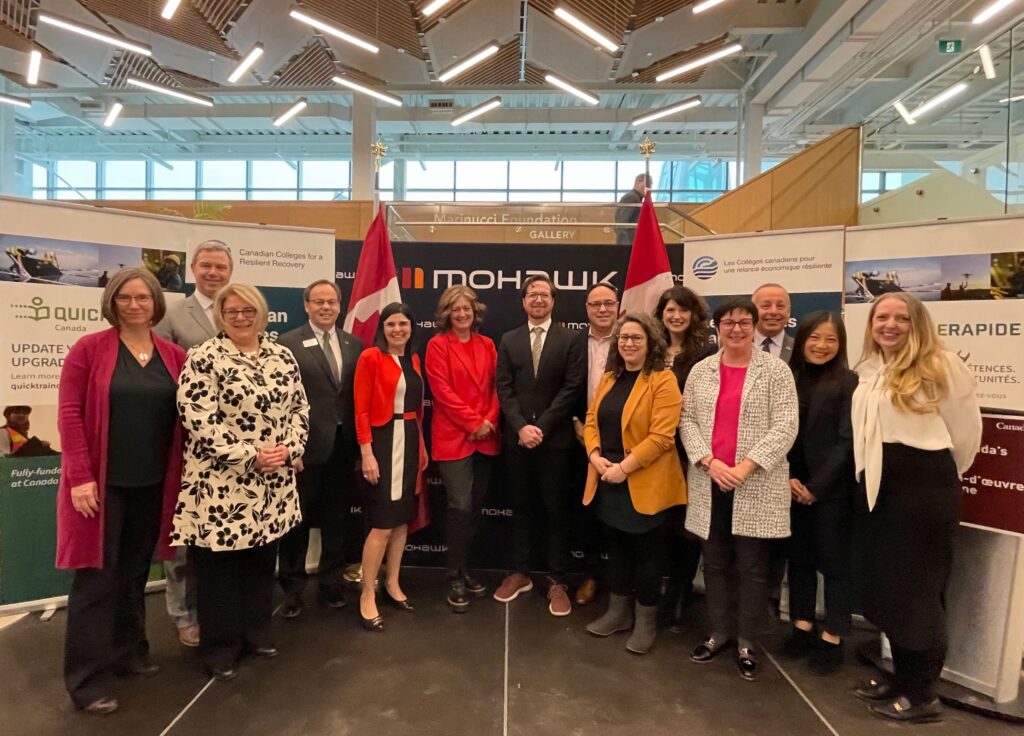Micro-credentials, maximum impact: Quick Train courses contribute to cleaner, more inclusive economy
Manitoba’s only polytechnic is ready to boost Canada’s resilient recovery, with the introduction of Quick Train Canada, a fully funded series of micro-credentials from post-secondary institutions throughout the country.
RRC Polytech is part of a coalition of Canadian colleges, polytechnics and cégeps, called Canadian Colleges for a Resilient Recovery (C2R2), that worked together to secure federal funding for this important training initiative, and is the only Manitoba institution to offer Quick Train courses.
C2R2 formally launched Quick Train at Mohawk College in Hamilton this morning, with the announcement of a $46.5-million investment from the federal government’s Sectoral Workforce Solutions Program.
“One of our strengths as a polytechnic is offering agile, relevant training that empowers people to excel in their fields,” says Dr. Christine Watson (shown above, third from left), RRC Polytech’s Vice-President, Academic.
“This funding creates access to important upskilling and re-skilling opportunities throughout their careers, ensuring Manitoba has a workforce that contributes to a more sustainable and equitable economy.”
Quick Train programming is designed to enable workers and employers to update their skills quickly through multi-week, virtual and in-person learning. Each of the 14 C2R2 institutions offers
Quick Train courses specific to their areas of expertise, all of which support Canada’s transition to a low-carbon economy while fostering equity, diversity and inclusion in the workplace.
Through this partnership, Manitobans have access to Quick Train micro-credentials from C2R2 institutions across the country. Many courses are offered in-person for local learners, while others are entirely virtual.
“The transition to the new low-carbon economy will demand a well-trained workforce and Canada’s colleges and aligned institutions are well-equipped to develop and deliver the programs to prepare people for those exciting new careers,” said Ron J. McKerlie (shown, fourth from left), President and CEO of Mohawk College, where C2R2’s administration and secretariat are managed.
“The Canadian Colleges for a Resilient Recovery coalition has developed Quick Train Canada to provide Canadians with a direct link to thousands of training and research opportunities to help Canadians access good jobs. We are excited to support the transition to the low carbon economy while fostering inclusion, diversity and equity throughout the process.”
RRC Polytech currently offers six Quick Train courses through the C2R2 initiative — three that focus on Clean Tech (Introduction to Electric Vehicle Technology, Electric Vehicle Communication and Computer Systems, and Building Envelope Science: Principles and Practice), and three that focus on Social Innovation (Engagement and Relationship-Building with Indigenous Communities, Indigenous and Canadian Government Relationships, and The Consultation Process).
The tuition-free courses are currently full, though the College plans to launch more Quick Train courses this Spring.
“The Quick Train initiative demonstrates that Canadian institutions thrive when we work together,” says Watson. “As the only post-secondary institute in Manitoba involved with C2R2, it was important for us to work with our partners to establish a resource that will benefit not only Manitobans, but anyone across Canada looking to update their skills.
“Our partnership with C2R2 allows us, in particular, to showcase RRC Polytech’s significant contribution to electric vehicle applied research and training on a national scale.”
RRC Polytech’s Vehicle Technology & Energy Centre (VTEC) is a local leader in EV technology, having recently worked with Frontiers North Adventures, a Churchill-based touring company, to convert their diesel-powered tundra buggies to battery electric vehicles, as well as providing supplemental training to Winnipeg Transit on electric bus maintenance.
Since 2020, 14 leading Canadian post-secondary institutions have worked together as C2R2 to lead Canada’s transition to a clean economy by bridging the skills gap for a strong recovery from the COVID-19 pandemic.
For more information, visit rrc.ca/quicktrain.

